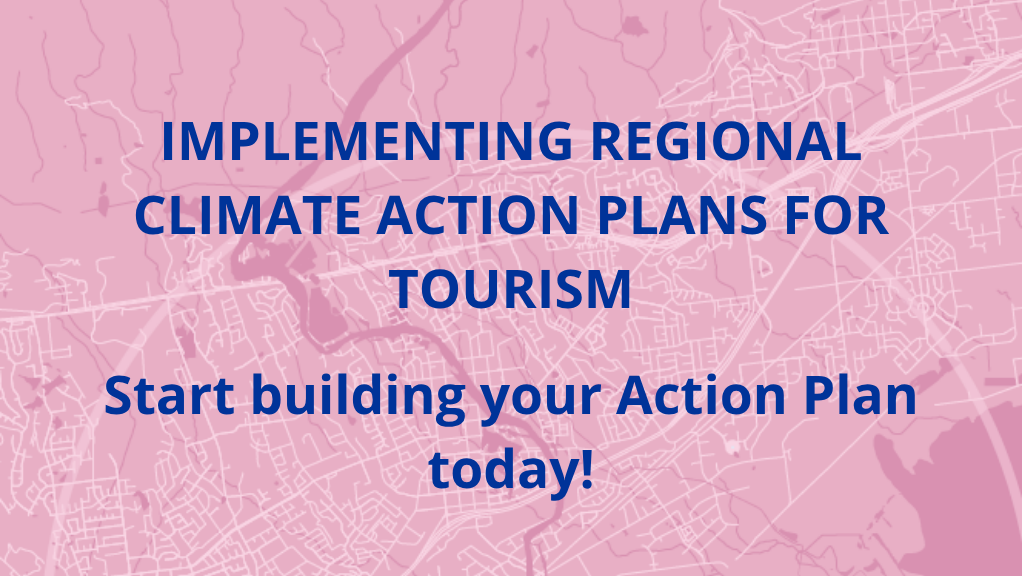The Mediterranean, home to over half a billion people, is the world’s leading tourism destination, welcoming over 400 million international arrivals in 2019. Known for its rich cultural heritage and varied coastal landscapes, it includes many of Europe’s most popular tourist spots. Coastal and maritime tourism play a vital role in the economies of many Mediterranean countries. But this economic and environmental asset faces growing threats from the worsening impacts of climate change. Tourism itself is a significant contributor to climate change, responsible for 8–11% of global emissions, driven by transport, construction, and resource use.
As the climate crisis deepens, tourism destinations in the Mediterranean, and globally, must take action. The Interreg Euro-MED Sustainable Tourism Mission, working with international experts, has created a clear and practical training package to help destinations design and carry out effective Climate Action Plans.
The initiative offers key resources developed by experts: the Blueprint for Tourism Climate Action Plans, the Climate Action Planning Toolkit, and a series of capacity-building sessions. These tools, aligned with the goals of the Glasgow Declaration on Climate Action in Tourism, give tourism stakeholders the guidance they need to develop a solid climate strategy.
A new online training series builds on this progress. Developed and led by leading experts, the training blends practical tools, real-world examples, and interactive learning. It supports Destination Management Organisations (DMOs), public authorities, and other key actors in stepping up their climate action.
Participants explore two core resources—the Blueprint for Tourism Climate Action Plans and the Climate Action Planning Toolkit—and receive step-by-step guidance through every stage of planning. These include: creating enabling conditions, assessing climate risks and opportunities, setting strategic goals, and choosing high-impact actions using the Travel Foundation’s Prioritisation Tool.
The training concludes with strategies for implementation, with a strong focus on monitoring, reporting, and ongoing improvement. The course is free and open to all tourism professionals aiming to align their destinations with global climate goals and build long-term resilience. Please feel free to contact community4tourism@interreg-euro-med.eu to know more about the course.
Download the resources ⬇️
These tools answer the Glasgow Declaration’s call for measurable, credible, and inclusive climate action in tourism. Rooted in real-world challenges and developed by practitioners and experts, the resources are designed to support all tourism stakeholders—no matter where they are starting from.
These tools have been developed in the framework of Community4Tourism and NaTour4CChange commissioned by the CPMR-IMC and NECSTouR with the support of the Travel Foundation.
How did the Blueprint and capacity building support help you in starting or improving your climate action strategy?
For us as a DMO, the Blueprint served as a clear roadmap that made it easy to get started. Instead of waiting for the “perfect moment,” we could simply dive in and learn along the way. The guide and training lowered the threshold, encouraged internal collaboration, and provided well-founded knowledge and best practice examples. Together with the workshops, it gave us the confidence and tools to handle the process in-house, something that would otherwise might have required external support.
What was the most useful aspect?
The most valuable feature is how approachable and non-dogmatic the guidelines are. The template is flexible enough to fit several contexts, allowing us to build on work we had already started. The combination of a clear framework and expert-led training made the steps easy to grasp and directly actionable, ensuring we could move. One way to further improve the template would be to transform it into an interactive online tool.
How did the C4T training sessions on the Blueprint & Toolkit, or the tools themselves, help you in starting or improving your climate action strategy?
Training sessions on the Blueprint and the Toolkit itself provided us with an extensive framework in preparing Destination Tourism Climate Action Plan for destination Dugi otok, Zadar County, Croatia. Even though the Blueprint is designed to guide public bodies with the mandate to direct the tourism development, and NATURA-JADERA is institution having mandate in the protection of nature, not in tourism, it was very useful tool in finding the synergy between the two interconnected fields such us tourism and nature protection.
What was the most useful aspect?
In the process of defining the priority actions of Destination Tourism Climate Action Plan for destination Dugi otok, the Toolkit guided us, one step at the time, thorough the process of realistically assessing the capacities of the stakeholders of the Plan, and realistically determine the priority actions, given the present level of stakeholders’ capacities, including our own.


